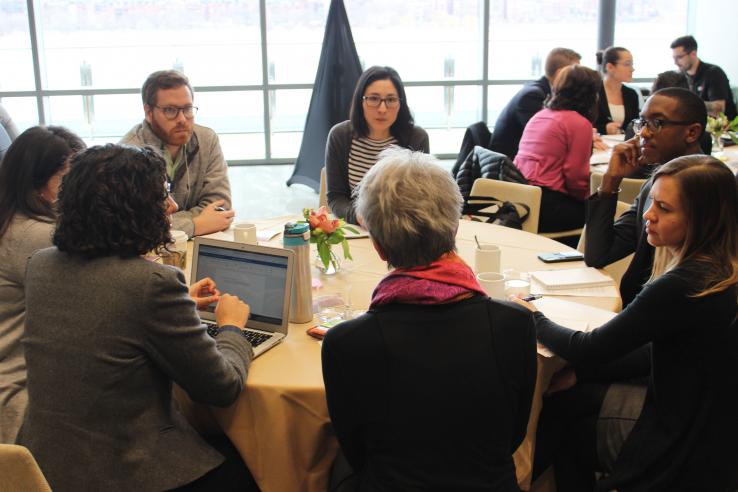Building Evidence, Advancing Policy, Impacting Lives: The 3rd Annual J-PAL North America State and Local Innovation Initiative Convening

The State and Local Innovation Initiative supports US state and local leaders in using randomized evaluations to generate new and widely applicable lessons about which programs work, which work best, and why. Selected jurisdictions receive project funding, technical support and connections with J-PAL’s network of researchers to help them develop high-quality, feasible randomized evaluations.
The theme of the third annual convening is Building Evidence, Advancing Policy, Impacting Lives (#BuildAdvanceImpact). Over the course of two days, panel and breakout sessions will demonstrate how rigorous evidence can help state and local governments shape policy to improve the lives of the people they serve, and in particular those living in poverty. Participants will have the opportunity to learn about and engage with the full life cycle of evidence generation and use, from developing and implementing randomized evaluations to the continued refining and testing of programs.
The convening will kick off on February 11 with a keynote address by Dr. Nathaniel Hendren, J-PAL Affiliate, Professor of Economics at Harvard University, and a founding Co-Director of Opportunity Insights. Both days will feature state and local policymakers who have been leaders in building rigorous evidence and using it to advance policy in their jurisdictions, and the researchers who have partnered with them to conduct high-quality evaluations.
You can find an agenda for the convening on the right hand side of this page.
Click on the links in the talk titles below to view video recordings of the convening sessions
Day 1 Sessions
Mary Ann Bates, Executive Director, J-PAL North America (slides)
Improving Economic Opportunity in America: Combining “Big Data” with Randomized Control Trials
Nathaniel Hendren, J-PAL Affiliate, Professor of Economics, Harvard University, and Founding Co-Director of Opportunity Insights (slides)
The Importance of Place: What it Means to Foster Social Mobility at the State and Local Level
- Elizabeth Babcock, President and CEO, Economic Mobility Pathways
- Ryan D. Rippel, Director of the Economic Mobility and Opportunity in the United States Program, Bill and Melinda Gates Foundation
- Rohit Naimpally, Senior Research and Policy Manager, J-PAL North America (Moderator)
Investing in Human Capital: What Have We Learned About What Works?
- Sarah Cohodes, Assistant Professor of Education Policy and Economics, Teachers College, Columbia University
- Susanna Loeb, Professor of Education and International & Public Affairs, and Director of the Annenberg Institute, Brown University
- Alicia Sasser Modestino, Associate Professor of Economics, Northeastern University
- Vincent Quan, Senior Policy Manager, J-PAL North America (Moderator)
Day 2 Sessions
Introduction to the Day and Closing Remarks
Rohit Naimpally, Senior Research and Policy Manager, J-PAL North America (slides)
John Scianimanico, Results-Driven Government Policy Lab Manager, Arnold Ventures (slides)
Bruce Sacerdote, Professor of Economics, Dartmouth College, and State and Local Innovation Initiative Co-chair (slides)
- Suzanne Barnard, Director of Evidence Based Practice, Annie E. Casey Foundation
- Chris Bishop, Executive Director of Regional Expansion, Nurse Family Partnership
- Alan Safran, President, Chair and Co-founder, SAGA Innovations
- Kristen Watkins, Policy Manager, J-PAL North America (Moderator)
Breakout Session: Addressing Questions in the Early Stages of Building Evidence
- Alyssa Erickson and Terri Smith, Creating Moves to Opportunity - Twin Cities (slides)
- Julie Heller and Ashley Carleton, Massachusetts Department of Transitional Assistance (slides)
- Sonja Karnovsky, City of South Bend, Indiana (slides)
- Christine Kroger and Teri Booth, San Joaquin County Public Defender’s Office and District Attorney’s Office, California (slides)
- Travis McIntyre and Jon Courtney, New Mexico Legislative Finance Committee (slides)
- Julie Moreno, Monica Trefz, and Aparna Ramesh, California Franchise Tax Board (slides)
- Charles Scott and Nellie Moore, Washington Metropolitan Area Transit Authority, District of Columbia
- DaiJuan Wade and Katie Gan, Department of Human Services, District of Columbia
- Kalila Jackson-Spieker, Senior Policy Associate, J-PAL North America (Moderator)
- Carrie Conaway, Chief Research and Strategy Officer, Massachusetts Department of Elementary and Secondary Education
- David Yokum, Adjunct Associate Professor, Brown University Policy Center
- Dayanand Manoli, Assistant Professor of Economics, University of Texas, Austin
- Kim Dadisman, Policy and Research Manager, J-PAL North America (Moderator)
Watch all the talks in the playlist here